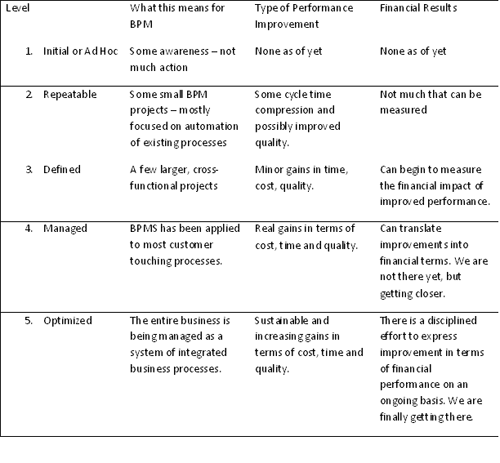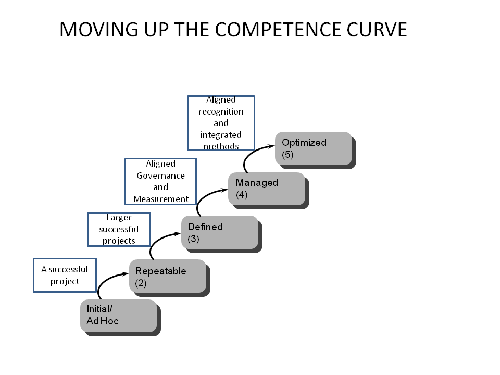Industry analysts such as Gartner have estimated that the size of the BPM market was well over $2.0 billion in 2011 and some industry observers believe that the global market for BPM will surpass $5 billion by 2017. However, a rapid increase in the size of the global BPM market does not necessarily mean that companies are getting the best value out of BPM. Accordingly, some senior managers are asking the very same question that parents going on a long drive with small children typically hear, which is – “Are we there yet?”
The answer to this question has little to do with the size of the market or with BPM maturity. There is no shortage of BPM maturity models, several of which are based on the Capability Maturity Model (CMM) framework, originally developed by the Carnegie Mellon Software Engineering Institute (SEI). While, there are other maturity models such as the Process Enterprise Maturity Model (PEMM), developed by Hammer and Co., the common theme underlying all these models is the lack of a clear link to the performance improvement and financial results.
Yet, that is precisely what senior managers care most about – improved performance – and that is much more a matter of competence than maturity. Consider Table 1 below which presents BPM competence in the context of a BPM maturity model structured roughly according to the CMM framework.

If the real question is one of BPM competence, then it’s equally important to examine how best to progress from one level to the next. Is it mainly a matter of increasing sophistication in the use of technology? To what extent are factors such as strategic alignment, BPM governance and integrated improvement methods of importance? These are thought provoking questions. One perspective of how best to progress from one level to the next on the BPM competence curve is presented in Figure 1 below. Note that this does vary from one organization to the next based on factors such as culture and leadership.

Figure 1: Moving Up the BPM Competence Curve
As Figure 1 indicates there are several knobs or levers that need to be manipulated to move up the BPM competence curve.
At levels one and two, successful process improvement project of increasingly larger scope are needed to capture the attention of senior management.
Then, the metrics that are monitored at the senior leadership team level, the methods deployed to improve operating performance, and extent of process based accountability and the nature of reward systems are some of the other factors involved in moving up the competence curve.
Metrics – based on measuring what matters to customers is one of the most powerful levers. As the well known management adage states, “You can’t manage what you don’t measure,” and when an organization begins to monitor metrics such as perfect order delivery performance and first time right responses to customer inquiries and complaints – the stage is set for facilitating dialogue with the leadership team around the need for cross-departmental collaboration and assigning accountability for end-to-end process performance. Establishing the size of the gap between current and desired performance for key metrics such as perfect order delivery and variance to promise date is needed to create urgency around taking action and provides the foundation for the other key levers discussed below.
Once an organization has had some success with BPM, establishing accountability for end-to-end process performance is another important factor. For those companies that have made significant progress in their process based thinking achieving level three or four, this can best be accomplished by appointing executive process owners for core processes. On the other hand, cross departmental service level agreements can serve this purpose within those companies that have made less progress in their process orientation.
The next powerful level involves a conscious effort to integrate various methods of process improvement and emphasize a tight collaboration with information systems. Lean, six sigma, and lean six sigma approaches have recently been reduced into fairly mechanical toolsets, emphasizing process improvements at a tactical and incremental level. Accordingly, such change initiatives have sometimes had mixed success and the financial benefits obtained from the use of these approaches can be limited and/or short-lived. Integration of BPM with these improvement methods is an important lever in moving up the BPM competence curve.
Aligning incentives is arguably one of the most complex levers. Many companies continue to structure recognition and reward systems solely in the context of traditional organizational boundaries. They do not realize that modifying recognition and reward systems to honor the people and teams who succeed in improving performance for clients is one of the cornerstones in deeply embedding and sustaining process based change programs.
Moving up the competence curve involves both demonstrating the real value of BPM in financial terms and shifting management attention to a process based view of business. Have you considered the benefits of moving up the BPM competence curve and how this demands improved collaboration across departments? I welcome your comments, questions and insights.

















